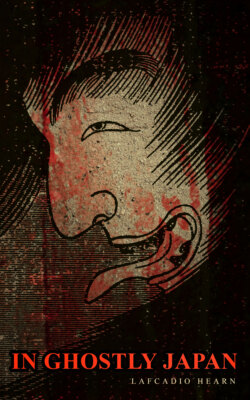Читать книгу In Ghostly Japan - Lafcadio Hearn - Страница 6
На сайте Литреса книга снята с продажи.
I
ОглавлениеI see, rising out of darkness, a lotos in a vase. Most of the vase is invisible, but I know that it is of bronze, and that its glimpsing handles are bodies of dragons. Only the lotos is fully illuminated: three pure white flowers, and five great leaves of gold and green,—gold above, green on the upcurling under-surface,—an artificial lotos. It is bathed by a slanting stream of sunshine,— the darkness beneath and beyond is the dusk of a temple-chamber. I do not see the opening through which the radiance pours, but I am aware that it is a small window shaped in the outline-form of a temple-bell.
The reason that I see the lotos—one memory of my first visit to a Buddhist sanctuary—is that there has come to me an odor of incense. Often when I smell incense, this vision defines; and usually thereafter other sensations of my first day in Japan revive in swift succession with almost painful acuteness.
It is almost ubiquitous,—this perfume of incense. It makes one element of the faint but complex and never-to-be-forgotten odor of the Far East. It haunts the dwelling-house not less than the temple,—the home of the peasant not less than the yashiki of the prince. Shinto shrines, indeed, are free from it;—incense being an abomination to the elder gods. But wherever Buddhism lives there is incense. In every house containing a Buddhist shrine or Buddhist tablets, incense is burned at certain times; and in even the rudest country solitudes you will find incense smouldering before wayside images,—little stone figures of Fudo, Jizo, or Kwannon. Many experiences of travel,—strange impressions of sound as well as of sight,—remain associated in my own memory with that fragrance:—vast silent shadowed avenues leading to weird old shrines;—mossed flights of worn steps ascending to temples that moulder above the clouds;—joyous tumult of festival nights;—sheeted funeral-trains gliding by in glimmer of lanterns; murmur of household prayer in fishermen's huts on far wild coasts;—and visions of desolate little graves marked only by threads of blue smoke ascending,—graves of pet animals or birds remembered by simple hearts in the hour of prayer to Amida, the Lord of Immeasurable Light.
But the odor of which I speak is that of cheap incense only,—the incense in general use. There are many other kinds of incense; and the range of quality is amazing. A bundle of common incense- rods—(they are about as thick as an ordinary pencil-lead, and somewhat longer)—can be bought for a few sen; while a bundle of better quality, presenting to inexperienced eyes only some difference in color, may cost several yen, and be cheap at the price. Still costlier sorts of incense,—veritable luxuries,— take the form of lozenges, wafers, pastilles; and a small envelope of such material may be worth four or five pounds- sterling. But the commercial and industrial questions relating to Japanese incense represent the least interesting part of a remarkably curious subject.
